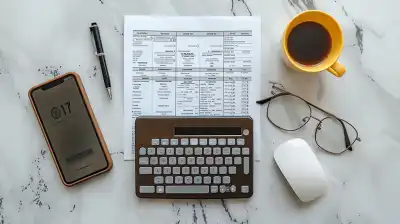13 September 2024
Finding the right bank can feel a bit like trying to pick the perfect pair of shoes. You wouldn’t want ones that pinch your toes or make walking uncomfortable. Similarly, choosing the wrong bank can leave you frustrated, overwhelmed, or even out of pocket with unexpected fees. But how do you find the best bank that fits your needs, lifestyle, and financial goals? Let’s dive into what you should look for when shopping for the right bank and how you can make a well-informed decision that serves you in the long run.1. Know Your Banking Needs
The first step in choosing the right bank is to understand what you need from a bank. Are you looking for a simple checking account to pay bills and handle daily expenses? Or do you need more advanced services like investments, loans, or high-yield savings? Here’s a breakdown of common needs to consider:

- Basic Checking Accounts: Ideal if you primarily need somewhere to deposit paychecks, pay bills, and swipe your debit card.
- Savings Accounts: If you’re aiming to save for the future, high-interest or money market savings accounts might be on your radar.
- Loans or Credit Products: Whether you’re eyeing a mortgage, car loan, or credit card, not all banks are created equal when it comes to lending rates and perks.
- Investment Services: If you’re into stocks, bonds, or mutual funds, consider banks that offer integrated investment platforms or partner with investment firms.
Think about what’s most important for you. It’s like ordering pizza: if you just want a quick snack, you might skip the gourmet stuff. But if you're craving something more substantial, you’ll want all the toppings.
2. Consider the Bank’s Fees and Charges
Bank fees are the hidden costs that can eat away at your hard-earned cash without you realizing it. Imagine signing up for a gym membership, but every time you use a different treadmill, you get charged extra! That’s what happens when you're hit with unnecessary banking fees. Here are some common fees to watch for:
- Monthly Maintenance Fees: Some banks charge just for having an account open, unless you meet specific requirements like maintaining a minimum balance.
- ATM Fees: If you withdraw money from an out-of-network ATM, expect to pay a fee.
- Overdraft Fees: Accidentally overdrawn your account? Some banks charge hefty penalties.
- Foreign Transaction Fees: If you travel or shop internationally, look for a bank that doesn’t charge foreign transaction fees.
Many banks offer “fee-free” accounts or have ways to waive certain fees. Don’t settle for a bank that nickel-and-dimes you—there’s always a better option.
3. Check the Bank’s Digital and Mobile Services
In today's world, who wants to go to a physical bank branch when you can manage everything from your phone? Whether you're transferring money, paying bills, or checking balances, having access to a reliable mobile app is a must. When evaluating a bank’s digital experience, consider these factors:
- User-Friendly Mobile App: Is it easy to navigate? Can you deposit checks through the app? Can you access customer support?
- Online Banking: Does the bank offer robust online services that make managing your account simple and straightforward?
- Mobile Wallet Compatibility: If you like using Apple Pay, Google Pay, or other mobile wallets, make sure your bank supports them.
Choosing a bank with strong digital features can save you time and hassle. In fact, many people pick a bank solely for its user-friendly app, especially those who live a fast-paced life.
4. Look for Customer Service Quality
Ever called customer service and felt like you were talking to a brick wall? We’ve all been there, and it’s frustrating. Whether you need to report a stolen card, ask about a suspicious transaction, or get help with a loan, the last thing you want is bad customer service. When comparing banks, try to find out:
- Is customer service available 24/7?
- Do they offer live chat, email support, or just phone service?
- Are there physical branches nearby if you need face-to-face help?
Reading online reviews can be a good indicator of a bank’s customer service reputation. A bank that’s quick to assist in emergencies or with questions can make all the difference when you need help most.
5. Evaluate Interest Rates and Perks
When you park your money in a bank, especially for savings, you want it to work for you, right? The more interest you can earn, the better. But banks can vary wildly in what they offer:
- Savings Account Interest Rates: Some banks offer next to nothing in interest on savings, while others provide much higher rates. Check if there are any tiered interest structures based on account balances.
- Checking Account Perks: Some banks offer cash-back rewards or interest even on checking accounts. Others may partner with retail stores for discounts.
- Bonuses for New Customers: Many banks offer sign-up bonuses if you open a new account and meet certain requirements, such as direct deposits within a set timeframe.
If your goal is to grow your savings, a high-yield savings account could be worth the search. And don't underestimate bonuses—sometimes, banks offer several hundred dollars just for signing up.
6. Local vs. National Banks vs. Credit Unions
Not all banks are the same, and where a bank is located—or how large it is—can influence your decision. Here’s a look at the different types of institutions:
- National Banks: Big names like Chase, Wells Fargo, and Bank of America offer widespread accessibility. You’ll find their branches and ATMs all across the country, but you might sacrifice personalized service or competitive rates.
- Local Banks: Smaller, community-oriented banks often pride themselves on personalized service. They may offer lower fees, but fewer branches and ATMs.
- Credit Unions: Credit unions are member-owned financial cooperatives. They often offer better rates and lower fees but may have more limited locations and digital tools compared to major banks.
It’s like comparing a local coffee shop to a Starbucks. The former might give you that friendly “regular customer” vibe, while the latter guarantees consistency no matter where you go. Both options have their perks—it just depends on what matters to you.
7. Look for FDIC Insurance (Or NCUA for Credit Unions)
It’s crucial to make sure your money is protected. The Federal Deposit Insurance Corporation (FDIC) insures deposits up to $250,000 per account holder in case the bank fails. Similarly, credit unions are insured by the National Credit Union Administration (NCUA). This means your hard-earned cash is safe, even if the bank or credit union faces financial difficulties.
8. Check Account Minimums and Balance Requirements
Some banks may require you to maintain a certain balance to avoid fees or even to earn interest. It’s important to:
- Check minimum opening deposit requirements. Some banks ask for a specific amount to open an account.
- Look for minimum balance requirements to avoid monthly fees.
- Ensure your balance is sufficient to earn interest in savings accounts.
If you're someone who prefers to keep low balances, make sure you choose a bank that doesn’t punish you for it.
9. Banking for Business Owners
If you own a business, your banking needs may differ from personal banking. Many banks offer tailored services for entrepreneurs, including:
- Business checking and savings accounts with different structures.
- Merchant services for handling credit card transactions.
- Business loans or lines of credit to help you grow.
Choosing a bank that understands the needs of small businesses can help you run things more smoothly, whether you're just starting or scaling up.
Conclusion
Choosing the right bank is more than just picking one that’s close to home or has the flashiest ads. It’s about finding a financial partner that aligns with your needs, offers transparency in fees, provides convenience through digital services, and gives you peace of mind with reliable customer support. By taking the time to assess your needs, compare options, and consider things like fees, interest rates, and service quality, you can ensure that your banking experience is smooth, hassle-free, and beneficial for years to come.
So, when you’re on the hunt for a bank, treat it like finding a good pair of shoes—it should fit well, be comfortable to use, and last for the long haul.


